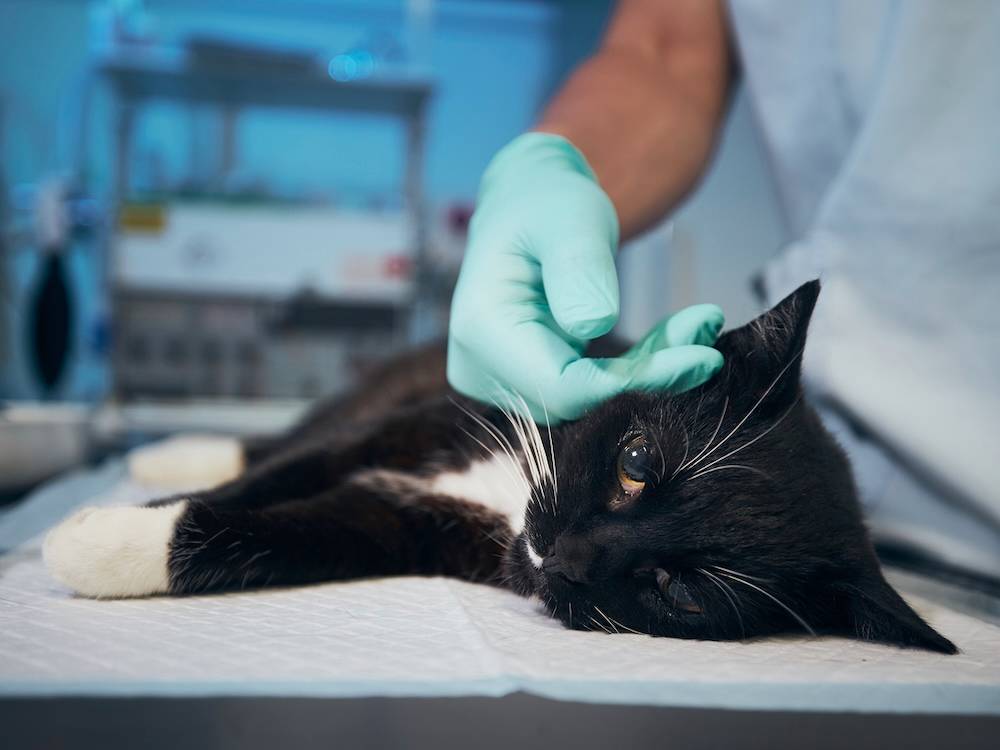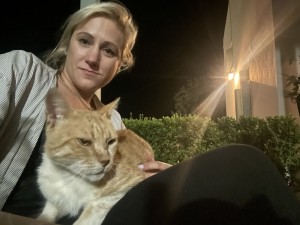Urgent Warning Issued to Pet Parents As Cat Poisoned By Fake ‘Flea Treatment’
Plus, how to spot counterfeit pet meds online

Share Article
Pet parents in the UK and the US are being warned not to trust flea treatments purchased from third-party sellers on online platforms after a cat in England was poisoned by one found to contain traces of a toxic insecticide.
Government agenciesopens in new tab have issued a warning against fake flea treatments masquerading as the real thing after Smokey the cat, from Preston in Lancashire, became unwell. His pet parent Alan Wall administered what he believed to be a genuine Frontline flea treatment purchased from a third-party seller on an online platformopens in new tab. The counterfeit product sent Smokey into a medical crisis, requiring emergency surgery on his intestines and a week-long stay at the vet. Thankfully, he is now doing much better.

Get (totally free) deals for food, treats, accessories, tech and way more pet parenting must-haves.
“Smokey is more than just a pet, he’s a member of our family,” says Alan. ”When he became ill, after using what we believed was a genuine flea treatment, we were terrified. Watching him suffer, not knowing whether he would pull through, was heartbreaking.
Veterinary tests later revealed what had caused Smokey’s severe reaction.
“It’s taken a huge emotional toll on all of us,” explains Alan. “Without the support of our vets and the extensive surgery they performed we know Smokey wouldn’t be with us today. We want to warn other pet owners about these fake products so that no one else has to endure what we’ve been through.”
Dr Heilin-Anne Leonard-Pugh, a Veterinary Medicines Directorate Veterinary Surgeon and Efficacy Assessor, explained why the substance in Smokey’s flea treatment caused such devastating damage:
“Pirimiphos-methyl is toxic to cats. Exposure to this insecticide can prevent the cat’s body from breaking down a substance called acetylcholine, leading to an overstimulation of the cat’s nervous system. This can cause symptoms such as vomiting, uncoordinated gait, muscle tremors, weakness, paralysis, increased sensitivity to touch, difficulty breathing, restlessness, urinary incontinence, low heart rate and seizures. In some cases, even death can sadly occur.
“If you suspect your pet has been exposed to a counterfeit medicine, seek veterinary advice immediately.”
Smokey’s case isn’t isolated. Elsewhere in the UK, Sue Horsman also purchased what appeared to be Frontline flea treatment for her cat but reported it to Trading Standards after she become suspicious of an odd smell. Experts confirmed the medicine was counterfeit and the online platform removed the seller – but not before they sold 211 batches to unsuspecting pet parents.
And the problem extends beyond UK borders. The United States Environmental Protection Agency issued a warningopens in new tab last year after discovering counterfeit pet pesticides (flea treatments) designed to look like legitimately registered products.
How to spot counterfeit flea treatments
The Environmental Protection Agency warnsopens in new tab that there’s no one way to tell if a product is counterfeit, but advises pet parents who buy products online watch out for these red flags when buying or using veterinary medicine products purchased online:
Weight inconsistency: the product feels different from what’s stated on the box.
Language barriers: directions aren’t in English or are poorly translated.
Safety failures: packaging isn’t child-resistant
Missing information: directions are incomplete or missing entirely.
Size problems: tablets or treatments seem too big for your pet (eg, a pill your cat would struggle to swallow).
Hidden origins: stickers covering foreign labelling.
Meanwhile, consumer investigation and protection leaders FACT.org.uk suggestopens in new tab that in addition to the above you should:
Trust your instincts: if the price is too good to be true, it probably is.
Check the quality: look for spelling and grammar on the box and the site you’re buying from.
Verify security: ensure the website address begins with “https” at the payment stage.
How to protect your pet against fake products
Boehringer Ingelheim UK and Ireland, the company that manufactures Frontline, issued the following statement:
“The health, safety and well-being of Frontline customers and their pets is our top priority and there are no quality or safety concerns with genuine Frontline products.
“Customers should take care to only buy genuine Frontline products and can find out where to purchase these on our websiteopens in new tab.
“If buying from an online marketplace, we recommend customers check who the product is sold by and fulfilled by. The star rating and seller feedback, number of reviews and whether they are pet specialist retailers is usually a good indicator of trusted sellers.”
Before you buy:
Purchase from authorised retailers or veterinary clinics.
Verify seller credentials on online platforms.
Compare prices - be suspicious of deals that seem too good.
Check packaging carefully before use.
If you suspect counterfeit products:
Stop using immediately and keep the product for testing.
Contact your vet if your pet shows any unusual symptoms.
Report to Trading Standards and where you bought it from.
Keep all documentation including purchase records.
Emergency warning signs
Seek immediate veterinary care if your pet shows symptoms such as vomiting, uncoordinated gait, muscle tremors, weakness, paralysis, increased sensitivity to touch, difficulty breathing, restlessness, urinary incontinence, low heart rate and seizures after flea treatment application.
Remember: genuine flea treatments are rigorously tested for safety. When you buy counterfeit products, you could be gambling with your pet’s life. The few pounds saved aren’t worth the potential thousands in emergency vet bills – or the heartbreak of losing your beloved companion.

Jess Commons
Jess is a writer, editor and former global lifestyle director at Refinery29 with previous stints at ITV, Grazia, The Debrief (RIP) and more. She is a sucker for an older gentleman cat with A Past and spends most of her time being told what to do by her toddler and her three-legged rescue cat, Mac.
Related articles
![picture of a golden labrador and human hands parting the hair on their neck]()
What to Do If You Find a Tick on Your Dog
It might give you the ick, but you need to take action
![]()
When Can My Kitten Go Outside in the UK?
If you’d like your kitten to grow up with outdoor access, here’s what to know to help keep them safe
![woman cuddling rag doll cat]()
Should I Be Deworming My Cat? Experts Explain
Everything you need to know
![puppy scratching fleas, get rid of fleas on dogs]()
Home Remedies for Getting Rid of Fleas on Dogs – Naturally
How to stop your home from becoming a flea circus



